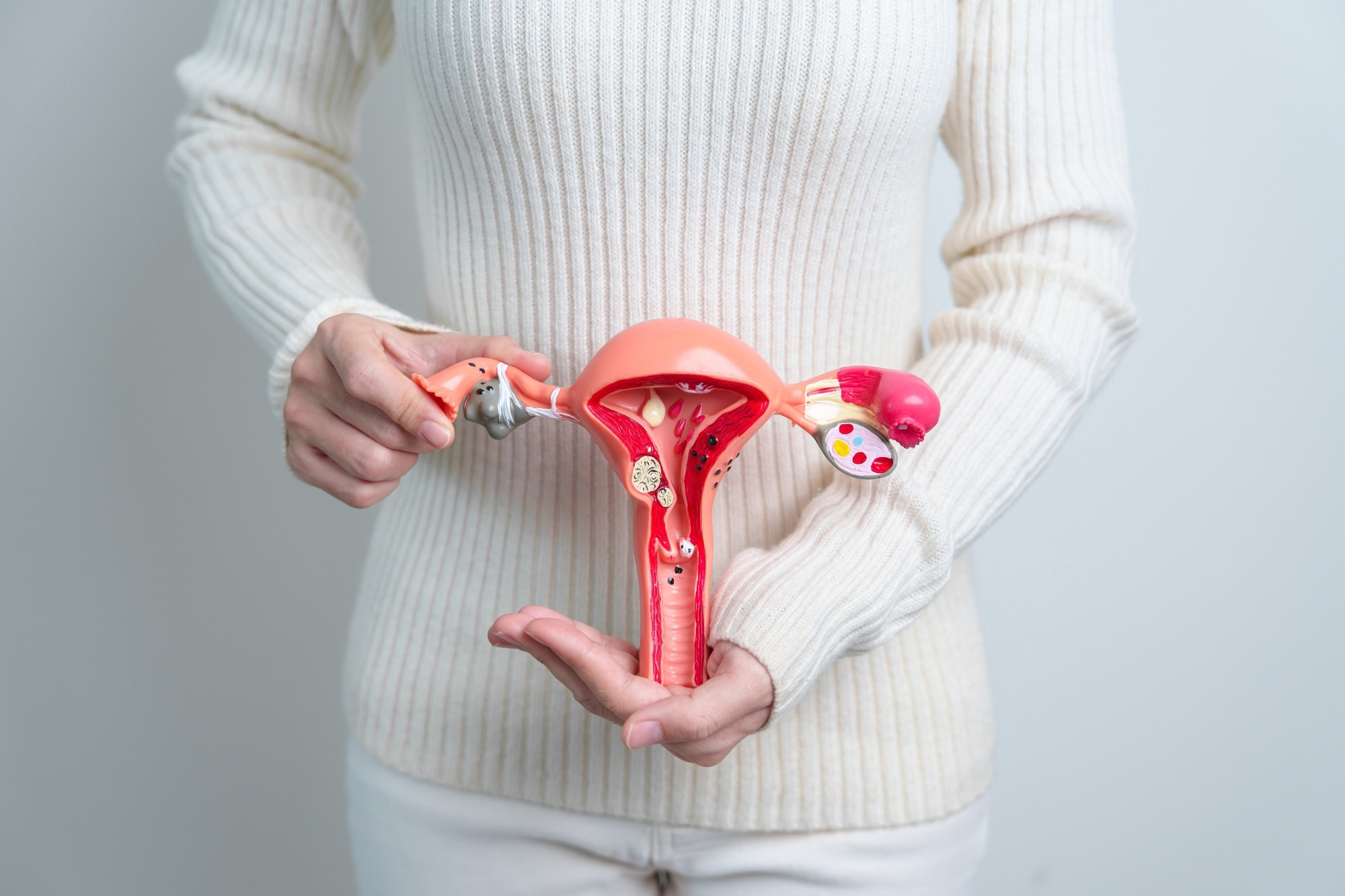Their conclusions highlight the need for continued robust research to provide relevant nutritional guidelines to the many women living with this disease.
 Study: How Can Selected Dietary Ingredients Influence the Development and Progression of Endometriosis? Image Credit: Jo Panuwat D/Shutterstock.com
Study: How Can Selected Dietary Ingredients Influence the Development and Progression of Endometriosis? Image Credit: Jo Panuwat D/Shutterstock.com
Background
Endometriosis is a chronic condition where endometrial tissue grows outside the uterine cavity. Chronic inflammation is associated with endometriosis, as is excessive oxidative stress in ectopic lesions.
The World Health Organization estimates that 10% of girls and women of reproductive age around the world suffer from this disease, which can cause severe pain and infertility, affects the immune system and digestive tract, and does not currently have a cure.
Dietary interventions may reduce inflammation, alleviate pain, and provide other benefits in treating endometriosis, improving patients' quality of life.
However, substances like bisphenol A (BPA), dioxin, and phthalates can be ingested along with food and have adverse effects due to their endocrine-disrupting properties.
To identify relevant research on these topics, the authors conducted a literature search in two databases, Web of Sciences and PubMed, shortlisting 171 articles published between 2013 and 2023.
Vitamins reduce pain, inflammation, and endometriotic lesions
Animal studies show that vitamin C and D supplementation can inhibit the size or volume of endometriotic lesions. In humans, vitamin C, D, and E supplementation has been associated with lower levels of inflammatory markers, oxidative stress, and pain.
Vitamin D also decreases the production of proinflammatory cytokines such as interleukin-17 (IL-17) and IL-6 and may reduce the invasiveness of endometrial cells.
Deficiency of vitamin D, conversely, could cause larger endometriotic lesions in the ovaries. Vitamins B1, B2, B6, B9, and B12 may be protective against endometriosis development.
Macroelement and microelement deficiencies exacerbate symptoms
Elements such as sulfur, calcium, sodium, magnesium, potassium, phosphorus, and chloride are required in large amounts in the diet. Imbalances in these nutrients can worsen symptoms of endometriosis, including fatigue, bloating, pain, and inflammation.
Microelements such as chromium, copper, selenium, iron, and manganese, which are necessary in trace amounts, may influence the development of the disease.
Studies have shown lower serum zinc levels (22-43%) in endometriosis patients compared to healthy control women.
Similarly, zinc concentrations in follicular fluid were lower in women with endometriosis compared to those who had tubal infertility. Selenium deficiencies may be associated with endometriosis-related infertility.
Endometriosis patients tend to have higher copper levels in their blood, urine, and follicular fluid. Iron, which causes oxidative stress, is often found in ectopic lesions, follicular fluid, peritoneal fluid, and blood in endometriosis patients but has not been linked to diet.
Endometriosis has been associated with nickel allergies, for which low-nickel diets may be beneficial. A small body of evidence suggests that high chromium levels could be a risk factor for the disease.
Mixed evidence on fatty acids, carbohydrates, and proteins
Fatty acids such as omega-3 polyunsaturated fatty acids (omega-3-PUFAs) and omega-6-PUFA modulate inflammation and can, therefore, significantly regulate endometriosis development.
Supplementing diets with fatty acids has been shown to reduce proinflammatory cytokines like IL-6. Omega-3-PUFA supplements can also suppress endometrial adhesion. However, the effect of supplementation on pain alleviation has not been well-studied.
Studies have found no link between fiber consumption and endometriosis risk. Notably, cruciferous plants, total plant fiber, and higher glycemic index foods are associated with higher risks, while fruit fiber consumption has a protective effect. Patients with endometriosis consume less maltose and glycogen than healthy women.
Increasing consumption of cheese, high-fat dairy, and total dairy is associated with a reduced risk of endometriosis. The protective effect of dairy is particularly strong for items with higher fat content but not low-fat products such as yogurt.
Animal protein intake has been observed to be lower in women with endometriosis, but poultry consumption is a risk factor for the disease. Replacement of red meat with items like eggs or fish may be protective.
The impact of estrogen derivatives remains poorly understood
Phytoestrogens in plants act as endocrine disruptors and may interact with endometriosis in complex ways.
Researchers believe that individual responses to phytoestrogens may vary considerably, with some individuals experiencing reduced inflammation and improved hormonal regulation while others may feel worsening symptoms.
Xenoestrogens, which are environmental, are believed to be strongly linked to the disease; researchers highlight the need to control exposure to these substances.
Conclusions
To sum up, endometriosis remains a poorly understood condition with limited treatment options and no currently known cure.
Improving nutritional guidelines for patients with this condition can improve their quality of life by reducing pain, inflammation, and disease pathology. However, further research is needed better to understand the role of different dietary and environmental elements.
Journal reference:
-
Abramiuk, M., Mertowska, P., Frankowska, K., Swiechowska-Starek, P., Satora, M., Polak, G., Dymanowska-Dyjak, I., Grywalska, E. (2024) How can selected dietary ingredients influence the development and progression of endometriosis? Nutrients. https://doi.org/10.3390/nu16010154. https://www.mdpi.com/2072-6643/16/1/154